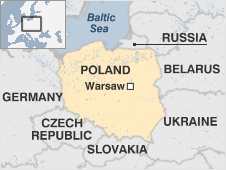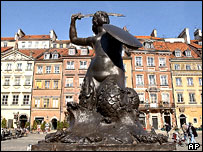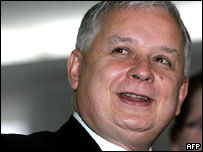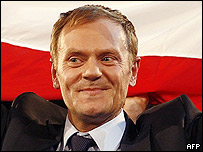 |
A nation with a proud cultural heritage Poland can trace its roots back
over 1000 years. Positioned at the centre of Europe it has known turbulent and violent times.
There have been periods of independence as well as periods of domination by other countries. Several million people half of them Jews died in World War II.
Overview
A new era began when Poland became an EU member in May 2004 five years after joining Nato and 15 years after the end of communist rule.

Warsaw has weathered wars and occupation
|
It was the birthplace of the former Soviet bloc's first officially recognised independent mass political movement when strikes at the Gdansk shipyard in August 1980 led to agreement with the authorities on the establishment of the Solidarity trade union.
The shoots of political freedom were trampled again 16 months later when communist leader Wojciech Jaruzelski declared martial law. But the movement for change was irreversible. Elections in summer 1989 ushered in eastern Europe's first post-communist government.
The presence in the Vatican of Polish Pope John-Paul II was an important influence on the Solidarity movement throughout the 1980s. The Roman Catholic church remains a very potent force in Polish life.
In the years between the end of communism and EU accession power in Poland switched between the centre right and the centre left. Successive governments faced sleaze allegations.
The country has had some success in creating a market economy and attracting foreign investment. There has been a massive movement of workers to western Europe.
Poland still has a huge farming sector which is unwieldy and very inefficient. Poverty is particularly widespread in rural areas.
Warsaw's profile on the international stage was raised by its support for the US-led military campaign in Iraq. A Polish-led international force including 2500 Polish troops took on peacekeeping responsibilities in south-central Iraq in September 2003.
Despite public criticism of the deployment the conservative government elected in 2005 reversed the previous administration's plan to pull the troops out in early 2006.
Facts
- Full name: Republic of Poland
- Population: 38.1 million (UN 2009)
- Capital: Warsaw
- Area: 312685 sq km (120728 sq miles)
- Major language: Polish
- Major religion: Christianity
- Life expectancy: 71 years (men) 80 years (women) (UN)
- Monetary unit: 1 zloty = 100 groszy
- Main exports: Machinery and transport equipment foodstuffs chemicals
- GNI per capita: US $11880 (World Bank 2008)
- Internet domain: .pl
- International dialling code: +48
Leaders
President: Lech Kaczynski

Lech Kaczynski evoked traditional and religious values
|
Lech Kaczynski from the conservative Law and Justice party won a run-off vote in October 2005. He enjoyed strong support from traditionalist and rural voters.
Mr Kaczynski Warsaw's mayor at the time of his election opposes rapid free-market reforms and favours retaining social welfare programmes. He has called for a return to Christian values and "moral change".
He co-founded Law and Justice with his identical twin brother Jaroslaw who heads the party.
Under the Polish constitution the president has fewer powers than the prime minister but has a significant say in foreign policy.
Prime Minister: Donald Tusk
Donald Tusk was asked by the president to form a government after the victory of his centre-right Civic Platform in elections in October 2007. His government was confirmed in office after winning a vote of confidence in parliament in November.

Donald Tusk wants better relations with the EU
|
As the Civic Platform party had insufficient votes to govern alone it agreed to a coalition with the centrist Peasants Party.
The early elections were forced by the collapse of the coalition led by Jaroslaw Kaczynski the identical twin of the president.
Mr Tusk has promised to end the regular sparring with the rest of the European Union and with neighbouring Germany in particular which marked the rule of the previous government which was led by the Law and Justice party.
He has also promised to calm Poland's tense relations with Russia which have been at their lowest ebb since Warsaw broke free from the communist bloc in 1989.
Media
Poland's broadcasting market is the largest in Eastern and Central Europe and has attracted investment from foreign media groups. There is freedom and diversity of information although laws against deriding the nation and its political system are still in force.
The public broadcaster TVP has the largest share of the audience for its two national TV channels. It also operates regional programmes and the international satellite channel TV Polonia.
There are proposals to fund public broadcasting from the state budget rather than the TV and radio licence fee.
Polsat and TVN operate the leading commercial TV channels. Polsat also operates a digital pay-TV platform and is present in the Baltic states. The digital pay-TV platform Cyfra+ was launched by France's Canal+.
Radio has become less important as a source of information and entertainment. Even so public Polish Radio still reaches just over half of the population and there are more than 200 stations on the air.
There are more than 300 newspapers most of them local or regional. However fewer than 30% of Poles read any kind of newspaper. Newspaper publishing is almost completely privatised and foreign ownership is high. The biggest-selling daily the Fakt tabloid was launched in 2003.
There were 20 million internet users in Poland by November 2008 - around 52% of the population (Internetworldstats).
The press
- Gazeta Wyborcza - mass-circulation daily
- Fakt - mass-circulation daily
- Rzeczpospolita - influential daily
- Dziennik - daily launched in 2006
- Super Express - mass-circulation tabloid
- Gazeta Polska - weekly
- Polityka - weekly
- Wprost - weekly
- Newsweek Polska - weekly
- The Warsaw Voice - English-language weekly
- Warsaw Business Journal - English-language weekly
- New Poland Express - English-language weekly
Television
- Telewizja Polska (TVP) - public operates two national networks regional services and international satellite channel TV Polonia
- TVN - commercial also operates news channel TVN 24
- Polsat - commercial channel and pay-TV operator
- Cyfra+ - pay-TV operator
Radio
- Polish Radio - public operates five national networks and many regional stations
- Polish Radio External Service - public
- RMF FM - commercial
- Radio Zet - commercial
- Radio Maryja - controversial Catholic station run by Redemptorist Order
News agency
-
Polish News Agency (PAP)
AFRICA | ASIA-PACIFIC | AMERICAS | EUROPE | MIDDLEEAST | SOUTHASIA
Mauritania Mauritius Morocco Mozambique Namibia Niger Nigeria Republic-of-congo Rwanda Sao-tome-and-principe Senegal Seychelles Sierra-leone Somalia South-africa Sudan Swaziland Tanzania The-gambia Togo Tunisia Uganda zambia Zimbabwe Australia Brunei Burma Cambodia China East-timor Fiji Indonesia Japan Kazakhstan Kiribati Kyrgyzstan Laos Malaysia Marshall-islands Micronesia Mongolia Nauru New-zealand North-korea Palau Papua-new-guinea Samoa Singapore Solomon-islands South-korea Taiwan Tajikistan Thailand The-philippines Tonga Turkmenistan Tuvalu Uzbekistan Vanuatu Vietnam Antigua-and-barbuda Argentina Bahamas Barbados Belize Bolivia Brazil Canada Chile Colombia Costa-rica Cuba Dominica Dominican-republic Ecuador El-salvador Grenada Guatemala GuyanaHaiti Honduras Jamaica Mexico Nicaragua Panama Paraguay Peru St-kitts-and-nevis St-lucia St-vincent-and-the-grenadines Suriname Trinidad-and-tobago United-states-of-america Uruguay Venezuela Albania Andorra Armenia Austria Azerbaijan Belarus Belgium Bosnia-hercegovina Bulgaria Croatia Cyprus Czech-republic Denmark Estonia Finland France Georgia Germany Greece Hungary Iceland Ireland Italy Latvia Liechtenstein Lithuania Luxembourg Macedonia Malta Moldova Monaco Montenegro Norway Poland Portugal Russia San-marino Serbia Slovakia Slovenia Spain Sweden Switzerland The-netherlands Turkey Ukraine United-kingdom Vatican Algeria Egypt Iran Iraq Israel-and-palestinian-territories Jordan Kuwait Lebanon Libya Mauritania Oman Saudi-arabia Sudan Syria Tunisia United-arab-emirates Yemen Afghanistan Bangladesh Bhutan India Nepal Pakistan Sri-Lanka The-Maldives

